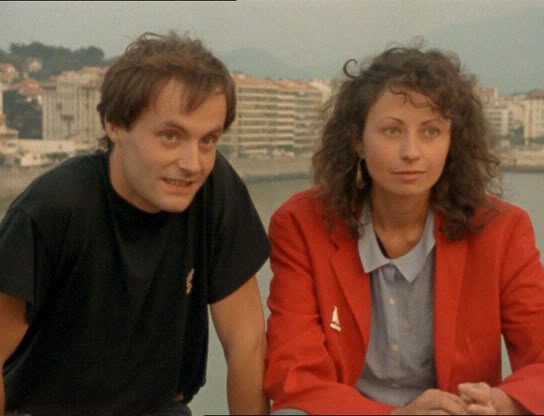The Gist:
Delphine’s friend has just cancelled their holiday together and suddenly she finds herself with the unappetizing prospect of a long summer at home in Paris. Most wouldn’t be so alarmed by this but Delphine (Marie Riviere) is lonely and desperate to escape the crushing tedium of the city. Still reeling from a long ago break up with her fiancé, she is stuck in a depressive cycle of self-loathing and deep misanthropy. She embarks on a number of unsuccessful, short lived holiday excursions at her friend’s requests, barely enduring the lingering conversations and jibes of the happy couples who surround her. She frequently bursts into tears and takes long introspective walks. But a final encounter near the close of summer offers hope.
The Review:
Towards the end of The Green Ray, Delphine overhears a group of elderly tourists discussing the green ray- that is, the slip of green light that can sometimes be observed on a clear night as the sun sets. The ray is powerful, they say, and emotionally illuminating. And this intrigues Delphine. She had been told earlier-by a horoscope- that green is her colour for the year. She pursues the ray. This is a film almost documentary-like in its precise depiction of everyday life and banality, but cut through are references to the strange- the superstitious and the miraculous. This combination makes it an incredibly compelling, affecting film.
For much of the The Green Ray little happens. Delphine moves from holiday destination to holiday destination. It is quiet and slow moving, a film of leisure and long, meandering conversations. These conversations, between Delphine and her friends, are mundane and repetitious; Delphine haltingly defending her vegetarian-ism to a baiting table of carnivores, her friends telling her she’s a drag. But this intimate portrayal of everyday encounters, the natural and improvised acting, make it absorbing, relatable and often acerbic.
It is helped by a protagonist played with such depth. Delphine is always playing with her hands- fiddling nervously with her hair, awkwardly scratching her neck, or she’s sitting stony faced, stock still among friends and flirtations. She appears defeatist, unshakably pessimistic on her future and potential for love. At times this is frustrating, sometimes comical- in one scene she bursts into tears at the thought of accompanying her family to Ireland. But it is perfectly illustrative of depressive slumps, when everything seems futile and unfair.
As the film progresses, our perception of her character morphs and she becomes almost admirable. Her complaints, her reluctance to engage ‘properly’ with ‘real life’, her unwillingness to yield to friend’s protests, portrays a stolid single mindedness. Her friends push her to be pro-active and to make an effort to meet men- even- shock horror, attend a group holiday. Delphine would rather wait. She believes in destiny. And references to fate litter the film- playing cards appear on sidewalks and listings for Tarot readers stuck to lampposts. She is lonely and sad but also quietly assured that pursuing is not for her- at some point, life will decide. Her patience pays off.
It is a poignant film, an illustration of all consuming loneliness, but, with an uplifting closing message. It champions non-conformism, offering a stringent defence of staying loyal to one’s character in the face of self-help speak attacks. And it offers an encouraging reminder that among great expanse of real world ennui the miraculous and strange can take place.
The Verdict:
An always compelling, restrained depiction of loss, depression, social expectation and individuality- big themes, but executed in an entirely-un-cloying, original and absorbing way, with excellent, improvised acting. Part of the Rohmer retrospective at the BFI.
Rating: PG
Director: Eric Rohmer
Starring: Marie Riviere, Lisa Heredia, Vincent Gauthier
Running Time: 98 minutes
Released: 1986 (Re-released 2015 at the BFI)


















No Comments